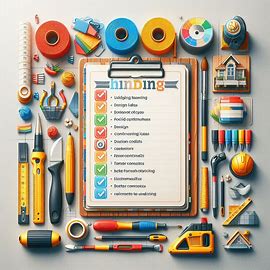
Introduction
Planning a home renovation is an exciting but complex journey. From setting a realistic budget to choosing the right contractors and materials, every detail matters. This comprehensive guide will walk you through every phase of the renovation process, offering a detailed, step-by-step checklist that ensures your home makeover is a success.
1. Pre-Renovation Preparation
1.1 Define Your Renovation Goals
Before you begin tearing down walls or choosing paint swatches, take time to understand why you’re renovating in the first place.
- Common renovation goals:
- Improve functionality
- Increase property value
- Enhance aesthetic appeal
- Accommodate growing family needs
Clearly defining your goals will influence every decision, from budgeting to choosing materials. Are you renovating for resale or to create your forever home? The answer helps prioritize investments and timelines.
1.2 Conduct a Home Inspection
A professional home inspection uncovers hidden issues that could derail your project.
- What to inspect:
- Foundation and structural integrity
- Electrical wiring
- Plumbing and drainage
- Roof condition
Knowing what you’re working with prevents costly surprises mid-project and allows you to integrate essential repairs into your plan.
1.3 Set a Realistic Budget
Budgeting is the backbone of successful home renovation planning. A well-structured budget includes more than just material and labor costs.
- Budget components:
- Labor
- Materials
- Permits and inspections
- Design fees
- Contingency (typically 10-20%)
Example Table: Basic Renovation Budget Breakdown
| Category | Estimated Cost (%) |
|---|---|
| Labor | 30% |
| Materials | 35% |
| Design Fees | 10% |
| Permits & Legal | 5% |
| Contingency | 20% |
By creating a flexible, itemized budget, you can make informed decisions and avoid overspending.
2. Planning and Design
2.1 Hire the Right Professionals
Your renovation team is critical to your project’s success. Depending on the scope, you may need:
- Architect or designer
- General contractor
- Structural engineer
- Specialized trades (plumber, electrician)
When hiring, request portfolios, check references, and ensure licenses and insurance are up-to-date.
2.2 Design and Layout Decisions
Work closely with your designer or architect to finalize layout changes, aesthetic details, and room functions.
- Open-concept vs. defined spaces
- Energy-efficient windows and insulation
- Smart home integrations
A thoughtful design not only improves function and style but can significantly boost long-term property value.
2.3 Acquire Necessary Permits
Permits ensure your renovation complies with local building codes and regulations.
- Common permits needed:
- Electrical
- Plumbing
- Structural changes
Skipping this step may lead to fines or complications during resale, so consult your contractor or city planning office.
3. Choosing Materials and Fixtures
3.1 Select Durable Materials
Choose quality materials that balance cost, style, and longevity.
- Hardwood vs. laminate flooring
- Quartz vs. granite countertops
- Ceramic vs. natural stone tiles
Don’t be swayed solely by trends. Focus on durability and how each material complements the rest of your home.
3.2 Sustainable and Eco-Friendly Options
Eco-conscious renovations are not just good for the planet—they also reduce long-term utility bills.
- LED lighting
- Low-flow faucets and toilets
- Recycled or reclaimed materials
Many governments offer incentives for eco-friendly upgrades, so research available grants or tax rebates.
3.3 Fixtures and Finishes
These details bring your design to life and should reflect your home’s character.
- Matching hardware (knobs, handles)
- Cohesive lighting fixtures
- Coordinated color palettes
Use a mood board or 3D rendering to visualize the final look before making purchases.
4. Execution Phase
4.1 Demolition and Site Prep
Before construction begins, prepare your home and family for the upcoming disruption.
- Remove valuables and fragile items
- Set up a temporary kitchen or bathroom if needed
- Inform neighbors about potential noise
Proper preparation reduces delays and protects your belongings.
4.2 Construction and Installation
This is where your plan comes to life. Regular communication with your contractor is key.
- Schedule weekly check-ins
- Monitor progress against your timeline
- Track expenses closely
Example Table: Typical Renovation Timeline
| Task | Duration |
| Demolition | 1–2 weeks |
| Framing & Rough-In | 2–4 weeks |
| Drywall & Painting | 2 weeks |
| Flooring & Fixtures | 1–2 weeks |
| Final Inspection | 1 week |
Delays can happen, so flexibility and patience go a long way.
4.3 Managing Problems and Changes
Even the best plans may need adjustments. Handle them proactively.
- Keep a written record of change orders
- Update your budget and timeline accordingly
- Prioritize changes that impact functionality and safety
Stay calm and rely on your team’s expertise to navigate unforeseen issues.
5. Post-Renovation Finalization
5.1 Final Inspection and Walkthrough
Once work concludes, conduct a final walkthrough with your contractor.
- Test all fixtures and appliances
- Check finishes and paint for imperfections
- Ensure permits have been closed
Create a punch list for any minor corrections. Don’t make the final payment until all items are resolved.
5.2 Clean-Up and Debris Removal
Ensure your contractor includes site cleanup in the contract.
- Remove leftover materials and debris
- Deep clean dust and surfaces
- Restore landscaping if affected
Consider hiring a professional cleaning service for the final touch.
5.3 Enjoy and Maintain Your New Space
Celebrate your new home and create a maintenance schedule to keep it looking fresh.
- Schedule seasonal maintenance
- Save receipts and warranties
- Take photos for insurance or resale
A successful renovation doesn’t end with the final nail—it continues with thoughtful upkeep.
Conclusion: Your Renovation Journey Awaits
Planning a home renovation doesn’t have to be overwhelming. With this comprehensive home renovation planning checklist, you’re equipped to manage every stage with confidence. Stay organized, remain flexible, and remember to enjoy the transformation.
Ready to start your renovation journey? Share your goals or questions in the comments below and connect with a community of fellow homeowners. Let’s build your dream space—one step at a time!